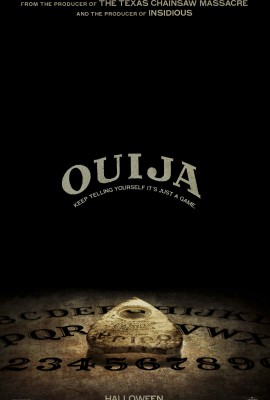Film Reviews

Ouija
Genre: Thriller
Director: Stiles White
Cast: Olivia Cooke, Daren Kagasoff, Douglas Smith, Bianca Santos, Ana Coto
MPAA-Rating: PG-13
Release Date: October 24th, 2014
John Wick marks the return of Keanu Reeves. With only a few lines of dialogue and a character driven by intensity and violence, discount Reeves has found the perfect vehicle to thrive in. This title character is defined by his facial expressions and by the legend that precedes him and the actor knows how to play him well enough to keep audiences on his side and rooting for him, help despite the mayhem he unleashes.
When the story begins, medications Wick lives a simple life in a large and meticulous house. There’s little we know about him save for the fact that he recently lost his wife (Bridget Moynahan). Wick is in mourning until a package arrives with a cute little dog his wife scheduled to be sent to him once she passed. The dog is a cute little companion to Wick and in a few sly scenes, we see Wick trepidatiously bonding with his new pet.
After a chance encounter with the smarmy Russian gangster Iosef Tarasov (Alfie Allen) at a gas station though, all of Wick’s life is sent into a tailspin. Tarasov and a Russian gang of thugs invades Wick’s house, steals his car and kills his dog.
The dog was one step too far.
What then unfolds is a traditional revenge tale featuring Wick avenging the death of his beloved puppy by slicing and dicing his way through the Russian mafia. The plot may be traditional but it’s the added details that make this drama stand out from its more stereotypical brethren. The uniqueness here starts with the dog. In choosing the dog’s murder as the impetus for the story, screenwriter Derek Kolstad wisely picked a character that would immediately earn the audience’s affection. A wife being murdered to start a revenge tale is more traditional but that also involves more dialogue and a complete relationship being built; featuring a dog is much easier because it allows the audience to bond with this puppy very quickly (and its cute looks help matters along).
John Wick steadily builds momentum until its final shootout, wasting little time in the process. The title character is a simple man and there’s little elegance or extravagance in his approach to violence (a far cry from the stylish Matrix series). The character here shoots people in the face like an accountant types numbers on a calculator. It’s just a job and the goal for assassins like him is simply to kill and not be killed.
There’s a simplicity here that is keenly appealing. Like the main character in the more stylish Drive, John Wick barely talks and there are few side moments that seem out of place. There’s also no fully-realized back story, which makes the legend of the main character even more appealing (“He was the one you get to kill the… Boogeyman,” one character notes in explaining Wick’s background). To its great credit though, the film subtly introduces keen parts of Wick’s former life. From the hotel known for hosting murderous monsters (it’s against the rules to conduct business there though) to the quiet crew sent in to clean up murder scenes, John Wick is detail-oriented, smart and a lot more subtle than you would think.
Welcome back, Keanu Reeves.
“Keep telling yourself it’s just a game” is the tagline featured on many of the posters for the new horror movie Ouija. The line implies that the board game is much, story
much more than a simple way to spend a quiet Saturday evening. The same idea can’t be applied to the movie, try
which is nothing more than a cheap and standardized horror movie that never strives to do anything more interesting.
It is just a movie and a lame one at that.
It opens with two young girls playing the famous game (“I don’t know if I want to do this,” one says before she acquiesces). Years later, those girls are all grown up and one of them— Debbie (Shelley Hennig)— is trying desperately to burn the game. Her plan falters and Debbie is soon found dead in her own home. Did Debbie kill herself or were there mysterious circumstances involved?
The other characters, especially Debbie’s best friend Laine (Olivia Cooke), want answers. How do these part teenagers seek answers? Well, the answer is obvious. They decide to play Ouija— yes, the game that Debbie warned Laine about before she was found dead. That’s the game they decide to play in Debbie’s own vacant house, which only days earlier had been a crime scene. Not only do they play the game once to talk to Debbie. They play it again and again even though strange events seemingly occur each time they play.
In the real world, repeating the same mistake over and over again can be referred to as showing stupidity. In Ouija, repeating the same mistake over and over again is known as good thinking (maybe this time, we’ll get closure and those evil demons will leave us alone, the characters believe!).
Aside from making this silly mistake over and over again, the characters are given little to do here. In fact, none of them are given any exciting or interesting personality traits. According to the film’s credits, there’s a character named Trevor (Daren Kagasoff) here, one named Pete (Douglas Smith) and one named Isabelle (Bianca A. Santos). The only personality trait they share is a willingness to make clichéd horror movie decisions at a moment’s notice. Just when you think one of them is smart enough to run away from the game, they reveal how silly they truly are.
I’m sure that a decent movie could have been made stemming from the idea of this board game. Ouija isn’t it. Director Stiles White knows how to create special effects (being the special effects production designer on Galaxy Quest presumably helped) but he doesn’t know how to build a good story. He settles for choosing pop-up scares again and again and letting the characters exist solely to make stupid decisions. Perhaps, Ouija is more than just a game but this film is nothing more than a series of inane scenes featuring lame characters who don’t know when to say game over.
Review by: John Hanlon










